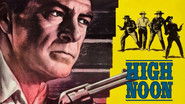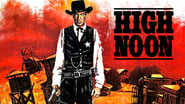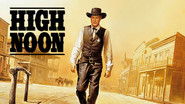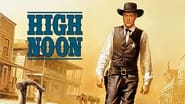James Hitchcock
To celebrate my 1700th review for IMDb, I turn to another of my favourite films. Will Kane is the Marshal of the small Western town of Hadleyville. The action takes place on what should have been the happiest day of his life. He is newly married to Amy, a beautiful, much younger woman, and is preparing to retire when he receives two pieces of news. Firstly, his successor as Marshal has been delayed on his way to the town, meaning that Kane will have to remain in office for a day longer. Secondly, Frank Miller, a dangerous outlaw whom Kane once arrested, has been released from jail and is on his way back to Hadleyville, swearing revenge. He is due to arrive at the station, where the rest of his gang are already waiting for him, on the noon train- hence the title.Amy, who is a Quaker and a pacifist, begs Kane to flee before Miller arrives, but he refuses; he has never run away from his duty and does not intend to start now. In any case, if he flees the gang will only come after him. He attempts to recruit a posse, only to find that the townspeople are unwilling to help him. Most are too afraid; others worry that a gunfight might harm the town's reputation or its commerce. Kane's deputy Harvey, resentful that Kane will not support him for promotion, resigns his office. Kane only receives two offers of help, both of which he declines, one from a one-eyed old man, the other from a teenage boy.Upon its release in 1952 the film was highly controversial. Given that it came out when the Korean War was being fought, its political meaning seems clear. Kane represents America as the "world's policeman". Miller represents Stalin, and the rest of his gang are Mao, Kim Il-sung and other Communist leaders. The townspeople represent peaceniks and others in the West who are too cowardly to stand up for democracy. The film is therefore an allegory of the need for a strong stand against international Communism.Well, actually, I don't suppose that screenwriter Carl Foreman, a well-known Hollywood Marxist, had that particular interpretation in mind, but it seems to me to fit rather better than the one many people, both on the Left and on the Right, have tried to give it, both at the time and later, namely that it is an allegory of McCarthyism. (There is a certain breed of film historian for whom every film from the fifties was secretly about McCarthyism, every film from the sixties and seventies about Vietnam and every film from the eighties and nineties about AIDS).The McCarthy allegory never works for me because the situation in the film is the precise opposite of the one which confronted America in the fifties. McCarthyism was all about an abuse of state power; the film is all about an unlawful challenge to legitimate state authority, and it is Kane, the upholder of that authority, who is its hero. If Foreman really did intend an anti-McCarthyite message, it seems to have been well hidden- so well hidden, in fact, that it even eluded the film's politically conservative star, Gary Cooper, who always denied it was a propaganda piece.The real reason for this film's greatness lies not in its supposed political message but in the power of Cooper's acting and Fred Zinnemann's direction, with special mention going to Dimitri Tiomkin's musical score, based around his song "Do Not Forsake Me, Oh My Darling". Cooper is now so firmly identified with this film that it is strange to think that he was not the first choice for Kane- that was John Wayne, who indignantly refused because he despised Foreman's politics. Nor was he second choice- that was Gregory Peck, who declined (something he later regretted) because he did not want to get typecast after playing a similar role in "The Gunfighter" the previous year. Nor was Cooper even third choice- Marlon Brando, Montgomery Clift, and Charlton Heston also turned it down. We cannot, of course, know how any of those actors might have played the role, but Cooper makes it his own, playing Kane as the embodiment of courage and integrity.It has been said that Beethoven's Fifth Symphony does not contain a single wasted note, and I have similar views about Foreman's script and Zinnemann's direction. There is not a single wasted line of dialogue, not a single wasted shot. Everything seems to contribute to a perfect whole and to a sense of unbearable tension as time inexorably ticks away, leading to the inevitable shoot-out between Kane and the outlaws. The tension is increased by depicting events in real time, with frequent shots of clock faces emphasising the passing of time between 10.40 am, when Kane first learns of Miller's impending return, and noon."High Noon" was nominated for seven Oscars and won four, including "Best Actor" for Cooper and two ("Best Score" and "Best Song") for Tiomkin, but lost out on "Best Director", "Best Screenplay" and "Best Picture", something which has been blamed on the political controversy surrounding it, although it may also have had something to do with the Academy's traditional snobbery about Westerns. (DeMille's "The Greatest Show on Earth", which did win "Best Picture", is a decent enough movie but not in the class of "High Noon"). Although the likes of Wayne and Howard Hawks (who were later to make "Rio Bravo" as their reply to it) attacked the film, not all political conservatives disliked it- President Eisenhower showed it at the White House and Ronald Reagan ranked it among his favourites. Sixty-five years on we can see just how right Ike and Ronnie were and that Wayne and Hawks, for all their talents, on this occasion made themselves look foolish. 10/10
zkonedog
Despite the fact that "High Noon" is highly regarded as one of the greatest western films of all- time, it took me a long time to actually spin it up in the DVD player. Probably because, to be honest, I was afraid it would be little more than a "stock western". When I did "give in", however, I now completely understand the praise.For a basic plot summary, "High Noon" is a story about an Old West town that is about to see the return of Frank Miller (Ian MacDonald), a convicted gunslinger freshly released and ready to wreak havoc on the town that sent him "up the river". Waiting for him is a posse led by fellow no- gooder Jack Colby (Lee Van Cleef). In the town itself, Marshal Will Kane (Gary Cooper) has just been wed to his beloved Amy (Grace Kelly) and about to begin the honeymoon when he gets news of Frank Miller's return. Kane's high moral standards compel him to stick around for the confrontation, but will he be able to rally the town around him to clean up the streets once again?There are two reasons why I consider this movie to be a cinematic classic:First, it is actually a very complex film in terms of thematic material. It is most definitely NOT the traditional 1950s western flick. The movie really delves into themes of humanity and how people react in times of great stress. Seemingly every single person or group of people in the film have their own set of values, and at some point they are all called into question as the intensity ratchets up.Secondly, the tension just continues to pick up as "high noon" (the train's destination time) approaches. With every passing moment, the weight of the day pushes down harder on Marshal Kane.The acting in this movie is also top-notch. Besides those already mentioned above, Thomas Mitchell, Lloyd Bridges, and Katy Jurado play great auxiliary roles, adding their own little niches to the overall tapestry.Overall, I really had no expectations going into this movie and by the time the credits rolled I was thoroughly impressed by the human drama. This is one of the most entertaining westerns ever made, provided you enjoy movies with great character interactions. Yes, you do get the gunfights and the typical western iconic landmarks, but you also get top-notch drama to boot.









